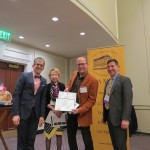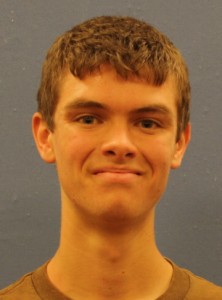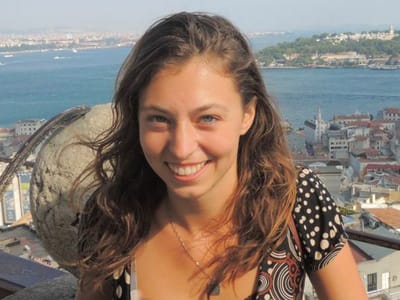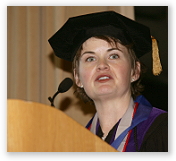Manson A. Stewart Scholarship
March 26, 2022
Olivia G. Simonson ’23 has won one of the seven Manson A. Stewart Undergraduate Scholarships awarded this year by the Classical Association of the Middle West and South (CAMWS). The other recipients are from the University of Iowa (two winners), the University of Michigan (two winners), the College of William and Mary, and Washington University in St. Louis
Olivia is a junior from Seattle, WA, majoring in Classics and Gender & Sexuality Studies, with a Linguistic Studies concentration. She plays flute in the St. Olaf Band but is spending this semester abroad at the University of Oxford.
CAMWS is a professional organization whose members include college and university professors, K-12 teachers, and graduate students of Classics. Founded in 1905 at the University of Chicago, it is the largest of the regional classical organizations. Its territory includes 32 midwestern, western, and southern states and three Canadian provinces.
The award was announced at the 118th Annual Meeting of CAMWS, hosted by Wake Forest University in Winston-Salem, NC. Each winner, who must be a sophomore or junior majoring in Classics at a college or university in CAMWS territory, receives $1000 along with a year’s membership in CAMWS.
Bolchazy Pedagogy Book Award
March 19, 2016
 Prof. Christopher Brunelle accepts the 2016 Ladislaus J. Bolchazy Pedagogy Book Award, shared with Profs. Anne Groton & James May, at the Annual Meeting of the Classical Association of the Middle West and South, held in Williamsburg, Virginia. Click here to read the news article.
Prof. Christopher Brunelle accepts the 2016 Ladislaus J. Bolchazy Pedagogy Book Award, shared with Profs. Anne Groton & James May, at the Annual Meeting of the Classical Association of the Middle West and South, held in Williamsburg, Virginia. Click here to read the news article.
Excavation and Field School Award
March 28, 2015
 Joseph A. C. Burkhart ’17, from Bloomington, Indiana, a double major in Classics and Chemistry, has won a 2014-2015 Excavation and Field School Award from the Classical Association of the Middle West and South. CAMWS awards two of these $2000 scholarships each year, with priority given to those who have never before participated in a summer excavation or field school at an archaeological site. Joseph will learn the basics of excavating an ancient Roman city (Antiochia ad Cragum) by attending St. Olaf’s Mediterranean Archaeological Field School in Gazipasa, Turkey, July-August, 2015.
Joseph A. C. Burkhart ’17, from Bloomington, Indiana, a double major in Classics and Chemistry, has won a 2014-2015 Excavation and Field School Award from the Classical Association of the Middle West and South. CAMWS awards two of these $2000 scholarships each year, with priority given to those who have never before participated in a summer excavation or field school at an archaeological site. Joseph will learn the basics of excavating an ancient Roman city (Antiochia ad Cragum) by attending St. Olaf’s Mediterranean Archaeological Field School in Gazipasa, Turkey, July-August, 2015.
Jefferson Fellowship
May 16, 2014
 St. Olaf College student Rebecca Frank ’14 was recently awarded a prestigious fellowship from the Jefferson Scholars Foundation to pursue a Ph.D. in classics at the University of Virginia.
St. Olaf College student Rebecca Frank ’14 was recently awarded a prestigious fellowship from the Jefferson Scholars Foundation to pursue a Ph.D. in classics at the University of Virginia.
The Jefferson Fellowship is one of the most highly selective merit graduate fellowships in the nation.
The $250,000 award will provide Frank, who is one of 17 recipients, with free tuition and health insurance for five years at the university, along with a $30,000 annual stipend and $7,500 in research funds.
The fundamental mission of the Jefferson Scholars Foundation is to identify, attract, and nurture individuals of extraordinary intellectual range and depth who possess the highest qualities of leadership, scholarship, and citizenship.
“Rebecca possesses all these qualities, and more,” says St. Olaf Professor of Classics Steve Reece. “She has demonstrated an extraordinary level of initiative and vitality throughout her career at St. Olaf.”
Frank was nominated for the fellowship by the University of Virginia Classics Department following her acceptance into the school’s Ph.D. program. The foundation then flew her out to Charlottesville, Virginia, where she interviewed before a committee and delivered a presentation on her past research.
“While I have presented scholarly papers to members of the classics community, this presentation challenged me to express my ideas in language accessible to those outside of the classical world and to articulate what I believe the study of the Greco-Roman past offers for us today,” says Frank, who plans to use her research funding to sponsor her attendance at additional academic conferences.
Frank has delivered scholarly papers at four international conferences in Greece and Canada. She spent a semester studying at Boğaziçi University in Istanbul and a summer excavating at the Antiochia ad Cragum archaeological field school in southern Turkey, where she will return again after graduation.
She recently presented her research at the Association of Ancient Historians annual conference in Montreal alongside St. Olaf Associate Professor of History Tim Howe.
“Professor Howe has been a wonderful mentor in helping me develop and hone my research skills in studying historiographical methods and my writing to present my research at conferences and in articles for publication,” says Frank. “The opportunity to immerse myself in these fields is one I am very grateful for.”
Manson A. Stewart Scholarship
April 5, 2014
To read the news story, click here.
Chance E. Bonar ’15 and Grace B. Koch ’15 have won two of the six Manson A. Stewart Scholarships awarded this year by the Classical Association of the Middle West and South (CAMWS). The other recipients are from the University of Michigan (two winners), the University of North Carolina at Chapel Hill, and Washington University in St. Louis.
CAMWS is a professional organization whose members include college and university professors, K-12 teachers, and graduate students of Classics. Founded in 1905 at the University of Chicago, it is the largest of the regional classical organizations. Its territory includes 32 midwestern, western, and southern states and three Canadian provinces.
The awards were announced on April 5 at the 110th Annual Meeting of CAMWS, hosted by Baylor University in Waco, Texas. Each winner, who must be a sophomore or junior who is majoring in Classics at a college or university in CAMWS territory, receives $1000 toward 2014-15 tuition, along with a year’s membership in CAMWS and a year’s subscription to The Classical Journal.
Law School Valedictorian
January 15, 2006
Signe E. Land Levine (St. Olaf ’92, Eta Sigma Phi member) was the valedictorian of the Class of 2006 at William Mitchell College of Law. Here is an excerpt from the write-up about her on the William Mitchell website:
“Class Valedictorian Signe Levine reminded graduates how small things can have great value. Using the metaphor of a peppercorn, Levine said how she has seen firsthand that helping someone deal with an injustice ‘may seem easy to us and as small as a peppercorn, but it makes a huge difference in the client’s life.’
“As a staff member on the Law Review, Levine published an article about the property contamination left behind by methamphetamines labs and the necessary legislation to notify potential property buyers. The Magna Cum Laude graduate plans to take a job as an associate with a firm she clerked for, Leonard, Street and Deinard, in its Commercial Real Estate Group.”

Collegiate Teaching Award
February 12, 2002
Each year the American Philological Association (APA) presents an award for Excellence in the Teaching of the Classics at the College Level. At its annual meeting in Philadelphia in January, 2002, the APA announced that the 2001 award was to be granted to St. Olaf alumna Pamela L. (Severson) Vaughn, Classics major from the class of 1971. Pam follows in a tradition of excellence in teaching of the Classics by those associated with St. Olaf; Jim May won the same award in 1986, Anne Groton in 1995.
From St. Olaf Pam went on to receive her Ph.D. at the University of California at Berkeley in 1988. She has served on the faculties of the California State University at Fresno and, since 1993, at San Francisco State University, where she is associate professor and chair of the Department of Classics and of the Department of Comparative and World Literature.
In many ways Pam’s success can be traced back to her experience at St. Olaf, of which she retains many happy memories: “I was a transfer student in 1969, so I felt a little lost, but I immediately found a home in Classics (my intended major since I was 14!). I remember sitting in the basement rooms in the pre-renovated Old Main happily reading Sophocles, Catullus, and numerous other classical authors with Prof. Lloyd Gunderson and Dr. Karelisa Hartigan (herself new to the St. Olaf campus then).
“My fiancé (and now husband) was a student at Carleton, and in those days we classics students could take classics courses at Carleton and participate in their seminars and lectures as well. So I happily shuttled between the two campuses.
“In my senior year, Professor Gunderson suggested that I write an honors thesis. Why not? I thought — and then I found out what was involved. It was my first real research project as a classics student, and I had the great privilege of being guided by R. G. Peterson, as well as Drs. Gunderson and Hartigan. I remember the relief when my committee approved the thesis and I turned in the final version — and then they told me I was required to do an oral defense! I believe I nearly fainted right there in the basement of Old Main! However, the event itself took place in the non-threatening environment of Professor Gunderson’s home. As the questions started to unfold, I began to question the wisdom of choosing Lucretius, De Rerum Natura, as my topic. In fact, I distinctly recall during the middle of the orals thinking: ‘Great, Pam — YOU had to pick something that was not only Latin poetry, but that left you wide open for questions on Epicurean and Stoic philosophy. Brilliant!’ Well, I wasn’t brilliant at that orals, but I survived; and Mrs. Gunderson revived me (and my committee) with a lovely tea. I hope I was compos mentis enough to remember to thank her.
“I shall always have a warm and fond spot for St. Olaf College and my time there; it was close to perfection. What I continue to appreciate most is the dedication of its faculty and the excellent models of teaching and scholarship I had there, and that I carry with me today. The joy of my St. Olaf days is one reason I continue to visit when I can and continue to be an alumna donor to this alma mater carissima.”
Here is the citation about Pam read at the APA meeting:
Professor Vaughn has done everything that a dedicated and innovative teacher of the classics can do. She has enriched the Classics profession through her devotion to students at her university and to students in the schools – and, owing to her extraordinary commitment to academic leadership, she has become a mentor for faculty in more than one discipline. As one of her colleagues describes her, “She is teaching excellence in action.” A student evaluation makes essentially the same point, though with a less inhibited degree of enthusiasm: “Pam is a Classics goddess!” Professor Vaughn instituted and continues to direct San Francisco State’s Student Forum on the Ancient World, in which undergraduates and graduates from all disciplines on campus submit papers for public presentation. She has established an annual Ancient World Day, a program that introduces Bay Area Latin teachers and their students to specialized areas in classics, like archaeology and numismatics. And she is an accomplished author for the classroom: most Classicists are familiar with Finis Rei Publicae: Eyewitnesses to the End of the Roman Republic (Focus Classical Texts, 1999), the excellent textbook written by Professor Vaughn in collaboration with R.C. Knapp.
In 1993, Professor Vaughn completely redesigned the Latin and Greek curriculum at San Francisco State, in which curriculum she actively teaches Latin and Greek authors, as well as courses in translation and in classical mythology. Especially innovative are her Seminar in Roman War Narrative and her course in Critical Approaches to Caesar. One student described that class in this way: “I was astounded at how many critical roads to Rome she entertained. Besides Caesar’s narrative, we set hypertext Latin search-engine programs, sub-textual theory-laden interpretations, inter-textual comparisons, and meta-textual modern parallels, to name a few. Combining her expertise in Caesar with the gumption to explore new territory made for one of my most memorable classes ever.”
Professor Vaughn is not an easy A. Her syllabus for Elementary Latin makes the point succinctly: “I do not grade on the curve; there is no extra credit; it is all about YOU and the LATIN!” Yet she is not unduly intimidating or off-putting: as one of her colleagues puts it, “Her students learn very early on that they can be serious and hard-working or they can leave. And yet they never leave.” They certainly do not leave the profession. One former student is on the faculty of Temple University. Several are in doctoral programs at Stanford, UC Berkeley, Washington, Ohio State and the University of Chicago. And many are teachers in the schools, on both coasts.
Her students give the truest portrait of this superlative teacher, for whom the commonest accolades celebrate her passion and compassion: “I am continually impressed by her vast reservoir of knowledge, her expertise, and her passion and love for all that she does.”
“I had never seen such joy in teaching before.”
“Every time she conjugates a verb or corrects a pronunciation, she does it with love – for the verb and for the student.”
It is especially moving to read about Dr. Vaughn’s distinctive combination of fellow-feeling with good sense: “After she heard I was hospitalized by a motorcycle accident, she mobilized students with materials and organized study sessions for me while I convalesced. She personally came to my bedside to make sure that her class would not get dropped. She did not let me lose heart when I did not have much else. Who would have ever thought Greek morphology and syntax could be medicinal!”‘
“I came to Dr. Vaughn after a class one day because my grandfather, who had been very sick with cancer, had taken a turn for the worse. As soon as I told her that I had to go home to Minnesota she knew that I needed more than my upcoming assignments. She gave me a hug and told me she was sorry. We then worked out a way that I could finish my Latin class, while still spending time with my grandfather before his death. Those last few weeks with my grandfather were the most precious of my life, and Dr. Vaughn’s understanding and compassion made them much easier.”
One of her former students expresses matters perfectly: “She is a born teacher. And her students love her. Perhaps that is the best definition of success.”
Old Main Display Case Contest
December 5, 2001
The winner of the third biennial competition in Greco-Roman archaeology and philology, sponsored by the St. Olaf Classics Department, is David Schiedler, sophomore Classics major from Fountain, Colorado, who successfully dated thirteen of fifteen ancient artifacts. In addition to much glory and honor, David wins a dinner for two at Northfield’s Byzantine Deli.
Honor and glory (but no dinner for two) go also to Christopher Brooks, Professor of Political Science, who successfully dated twelve artifacts; James Abraham, sophomore, who dated eleven; Nathan Olawsky, junior, who dated ten; and Seth Heringer, freshman, and Nina Alton, senior, who dated nine.
Congratulations to these and to the many others who participated in the competition.
Manson A. Stewart Scholarship
May 22, 2001
Kristina L. Alton is one of six undergraduate college and university students who have been awarded a Manson A. Stewart Scholarship by the Classical Association of the Middle West and South (CAMWS). Each winner receives $1000 along with a year’s membership in CAMWS and a year’s subscription to The Classical Journal, a quarterly publication containing a variety of articles on scholarly and pedagogical topics.
CAMWS is an organization of university, college, secondary, and elementary teachers of Latin, Greek, and all other studies that focus on the world of classical antiquity. Founded in 1905 at the University of Chicago, it is the largest of the regional classical organizations. The territory extends east as far as Ohio, south from Virginia, west to Utah and Arizona, and north into the Canadian provinces of Ontario, Manitoba, and Saskatchewan.
Students nominated for the Stewart Scholarship must be current sophomore or junior Classics majors at a college or university in the CAMWS area, who plan to take a minimum of two courses in ancient Greek or Latin during the junior or senior year in which the scholarship is held. No department may nominate more than two students for the award each year.
Alton is the third St. Olaf student to receive a Stewart Scholarship since the competition began in 1995: Catherine E. A. Kusske ’97, who majored in Classics, history, and Medieval Studies and is now pursuing an M.A. in China Studies at the Jackson School of International Studies, University of Washington, was a winner in 1996. Paul P. Moran ’00, a St. Olaf Classics major now studying for his Ph.D. in Classics at the University of Virginia, was a winner in 1999.
Marshall Scholarship
December 15, 2000
Matthew C. Steenberg ’01, Moscow, Idaho, has been named to one of America’s most elite groups of scholars: he’s one of 40 U.S. students who are Year 2001 recipients of $50,000 British Marshall Scholarships. The winners were announced Friday, Dec. 15 by officials of the British Embassy in Washington, D.C.
The esteemed British Marshall Scholarships make it possible for young Americans of high ability to study in the United Kingdom. The scholarships may be used at any British university and cover the costs of two years of study in any discipline, at either the undergraduate or graduate level, leading to the award of a British University degree.
Steenberg is a religion and classics major who plans to become an ordained member of the clergy and a professor. The first St. Olaf student to win a British Marshall Scholarship, he will use the award to obtain a Ph.D. in patristic theology from the University of Oxford.
Steenberg spent the 1999-2000 academic year studying at Harris Manchester College, Oxford University, England, as part of St. Olaf College’s Junior Year Abroad foreign studies program.
He is a key member of an international team of mostly priests and scholars who are translating the Septuagint from ancient Greek to New King James English for use by Orthodox churches. He has produced first drafts of six books for The Orthodox Study Bible: The Old Testament. The translation and study notes are slated for completion in 2004.
While at St. Olaf, Steenberg founded a service that produces software to print Hebrew and Coptic on the web; taught Visual Basic programming for America Online; and published several syllabi online. He served as president of the Oxford University Orthodox Christian Society. Before that he was Student of the Year in St. Olaf College’s Great Conversation program; was a student representative on that program’s Steering Committee; and was a sacristan for the St. Olaf chapel. He is currently the Classics Department’s Greek tutor and a TA for the Great Conversation program.
As a sophomore Steenberg won two divisions of the national undergraduate Greek translation contest. As a junior he was chosen as a member of USA Today‘s All-USA Academic Team.
The British Marshall Scholarships were started in 1953 and commemorate the humane ideals of the European Recovery Program (the Marshall Plan). They are funded by Great Britain’s Foreign & Commonwealth Office and administered by the Marshall Aid Commemoration Commission in the United Kingdom, and in the United States by the British Embassy in Washington, D.C., and five regional Consulates-General.
Scholarly Achievement Award
June 11, 1999
Recent St. Olaf College graduate Jeremiah Harrelson has been named a recipient of the 1999 Scholarly Achievement Award, sponsored by the American Bible Society.
Harrelson is among the top students selected each year from colleges and seminaries throughout the United States. Harrelson, a classics major from Green Mountain Falls, Colo., graduated magna cum laude and with Phi Beta Kappa honors from St. Olaf. While at St. Olaf he took four years of classical and Koine Greek, studied the history of the New Testament Greek text, and wrote an 80-page exegetical commentary on Paul’s Letter to the Colossians. He will continue his studies next year at Denver Seminary.
St. Olaf classics department faculty member Steve Reece presented Harrelson with the award May 15, during the annual meeting of Eta Sigma Phi, the Classics Honor Society. The award included a certificate signed by Eugene Habecker, president of the American Bible Society, and a copy of the Septuagint, the Greek translation of the Hebrew Scriptures.
The American Bible Society, a leading publisher, translator and distributor of Scriptures in the United States, sponsors the Scholarly Achievement Award to recognize excellence in biblical studies.
You must be logged in to post a comment.